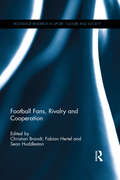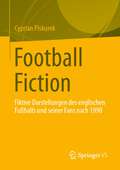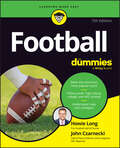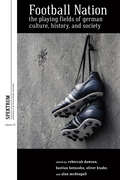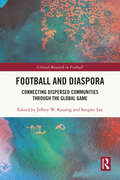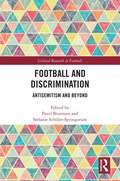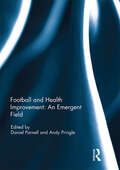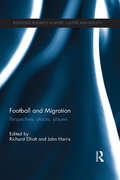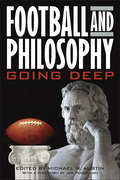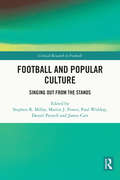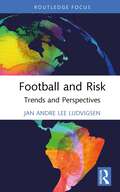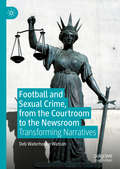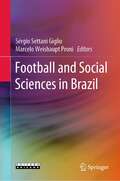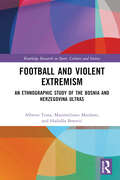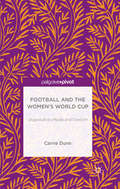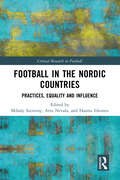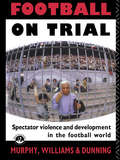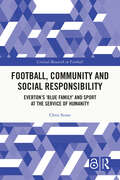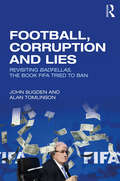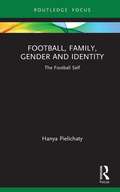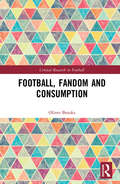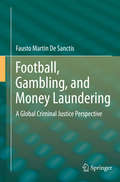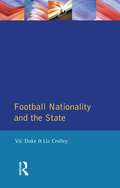- Table View
- List View
Football Fans, Rivalry and Cooperation (Routledge Research in Sport, Culture and Society)
by Fabian Hertel Christian Brandt Sean HuddlestonFootball is undoubtedly the sport with the largest following in the world, attracting billions of fans across the globe. These fans play an integral part in determining the identity of the football club they support. Many studies have focused on the intense rivalry between clubs, their fans and the opposing identities they represent. However, little attention has been paid to examples of cooperation between rival fans. This book is the first to explore antagonistic cooperation in football; the idea that rival fans can work together despite their animosity. With examples from Argentina, Brazil, Germany, Mexico, Croatia, Poland, Turkey, Ukraine, the UK, the US and Zimbabwe, this book brings together case studies on rival fans working together and explores how and why such cooperation takes place. Showcasing original research from a team of international football scholars, it sheds new light on the social and political complexities of contemporary football fan culture. Football Fans, Rivalry and Cooperation is fascinating reading for anybody with an interest in football studies, the sociology of sport, sport and politics, or sport and social theory.
Football Fiction: Fiktive Darstellungen des englischen Fußballs und seiner Fans nach 1990
by Cyprian PiskurekIn diesem Buch wird untersucht, wie die jüngere Fußballliteratur die entscheidenden politischen Entwicklungen im englischen Fußball nach der Veröffentlichung des "Taylor-Reports" 1989/90 verhandelt hat. Als unmittelbare Reaktion auf die Hillsborough-Katastrophe von 1989 und die wachsende Besorgnis über Hooliganismus schlug der "Taylor-Bericht" eine Reihe von Maßnahmen zur strengeren Regulierung von Fanmassen vor. Infolgedessen wurden die Stadien der höchsten Spielklassen in reine Sitzplatzstadien umgewandelt und mit Videoüberwachung ausgestattet. Die Umsetzung dieser Maßnahmen führte zu einem drastischen Rückgang der gewalttätigen Vorfälle, aber auch zu einem beispiellosen Anstieg der Eintrittspreise, was wiederum die Demografie der Zuschauer erheblich veränderte. Diese Entwicklung, die auch den Einzug des Fußballs in andere kulturelle Formen des Mainstreams ermöglichte, veränderte das Spiel entscheidend. Piskurek geht den Mustern in Prosa und Film nach, um herauszufinden, wie diese Fiktionen auf die veränderten Umstände des Fußballs nach Taylor reagiert haben. Dieses Buch, das diese politischen Veränderungen mit einem kulturellen Blickwinkel betrachtet, ist bahnbrechend in seiner Analyse der Fußballfiktion als Ganzes und bietet einer Reihe von Wissenschaftlern und Studenten mit Interesse an Kulturwissenschaften, Soziologie, Freizeit und Politik eine neue Perspektive.
Football For Dummies, USA Edition
by John Czarnecki Howie LongLearn how to tell a first down from a touchdown and get up to speed on the latest trends in the sport Football For Dummies is a comprehensive fan’s guide to football and its many components. This updated edition includes coverage of new players, rules, and strategies. With deep explanations of every position, analysis of offense and defense, and detailed strategies for play, football legend Howie Long and established football analyst John Czarnecki present the basics of football for fans of all ages and experiences. Get the working knowledge that you need to follow the game of football and enjoy it with friends and family. The book covers everything you need to be the most knowledgeable spectator in the stadium! Learn the rules of football so you can follow what’s happening in the game Increase your enjoyment of football by discovering the nuances you don’t know Keep up with friends and family when you watch games together, in person, or on TV Get up to date on the latest players, rule changes, and top strategiesThis fun Dummies guide is for everyone who is interested in football and wants to get familiar with the sport, including its history, so they can watch games in person and on television, follow all the action, and enjoy football games to the maximum. It’s also a great reference for fans who need to settle bets about the official rules of play!
Football Nation: The Playing Fields of German Culture, History, and Society (Spektrum: Publications of the German Studies Association #25)
by Alan McDougall Rebeccah Dawson, Bastian Heinsohn, Oliver KnabeOver the past century, the impact of football on Germany has been manifold, influencing the arts, political debates, and even contributing to the construction of cultural memories and national narratives. Football Nation analyses the game’s fluid role in shaping and reflecting German society, and spans its focus on modern German history, from the Wilhelmine era to the early 21st century. Expounding on topics of gender, class, fandom, spectatorship, antisemitism, nationalism, and internationalism, a diverse group of interdisciplinary scholars offer a novel approach to understanding the many influences of football throughout its extensive history which until recently has only been available to a German-speaking readership.
Football and Accelerated Culture: This Modern Sporting Life (Routledge Research in Sport, Culture and Society)
by Steve RedheadIn Football and Accelerated Culture, Steve Redhead offers a new and challenging theorisation of global football culture, exploring the relationship between sport and culture in a rapidly shifting world. Incorporating cutting-edge concepts, from accelerated culture and claustropolitanism to non-postmodernity, he reflects on the demise of working class football cultures and the rapid media globalisation of ‘the people’s game’. Drawing on international empirical research and a unique and ground-breaking study of football hooligan memoirs, the book delves into a wide array of disciplines, examining fascinating topics such as the relationship between music and football; hooligans and ultras; the rise of social media and anti-modern football movements; and ultra-realist criminology. Football and Accelerated Culture offers a new way of thinking about sporting cultures that expands the boundaries of physical cultural studies. As such, it is important reading for anybody with an interest in the culture of sport and leisure, social theory, communication studies, criminology or socio-legal studies.
Football and Diaspora: Connecting Dispersed Communities through the Global Game (Critical Research in Football)
by Jeffrey W. Kassing Sangmi LeeThis is the first book to examine football (soccer) through the lens of diaspora studies. Presenting case studies from across four continents, it considers how diasporic minorities develop a sense of belonging between their national and transnational ethnic communities through an active participation in football. Bringing together a cross-disciplinary group of scholars working in anthropology, communication, cultural studies, history, psychology, politics, sociology and sport, it unearths the connections between culture, identities, politics, nationalism, globalization, and how those manifest in the lived experience of diasporic peoples. Against a background of the continued internationalization of sport and pervasive global migration, it explores key themes in the social sciences including migration, acculturation, and assimilation; sport, identity, fandom, and representation; and nationhood, citizenship, and politics. As the book focuses on diverse ethnoreligious groups dispersed around the world, it covers a wide range of geographic locations, with cases addressing the Bolivian, Ethiopian, Moroccan, Zimbabwean, Croatian, Irish, and Basque diasporas. It is fascinating reading for anybody working in sport studies, diaspora studies, political science, sociology, cultural studies, international history or social history.
Football and Discrimination: Antisemitism and Beyond (Critical Research in Football)
by Stefanie Schüler-Springorum Pavel BrunssenThis book takes a close look at discrimination in football in order to illuminate our understanding of the interaction between sport and wider society, politics and culture, particularly in terms of the (re)production of identity. It presents insightful and diverse international case studies, including the shadow of fascism in Italian football; fan activism against racism, sexism, and homophobia in US soccer; migrant football clubs in Germany, and the use of football club history in the teaching of antisemitism. Together they demonstrate the damaging societal consequences of unchecked resentment and discrimination in football fan cultures but also the potential for fan activism as a socio-positive force. This is fascinating reading for anybody with an interest in football or fandom, the sociology of sport, cultural studies, or political science.
Football and Health Improvement: an Emergent Field (Sport in the Global Society – Contemporary Perspectives)
by Daniel Parnell Andy PringleThere is developing interest in the use of sporting settings as a channel to connect people to health improvement services and an emerging body of research highlights football as being associated with positive motivational and social elements that support the maintenance of a physically active lifestyle. This text provides insights into a range of issues surrounding the role of football as a vehicle for health improvement for different groups.The contributors to this volume share some of the challenges and the benefits of using professional football settings as a channel for connecting people to health improvement opportunities. These chapters will be of interest to a range of stakeholders involved in research, policy and practice who stand to benefit from building partnerships with colleagues with expertise in (I) conducting evaluation and (II) reporting evaluation and research outcomes in peer-reviewed mediums, reflecting the value of partnerships between football-led health improvement and evaluators. This book was previously published as a special issue of Soccer & Society.
Football and Migration: Perspectives, Places, Players (Routledge Research in Sport, Culture and Society)
by John Harris Richard ElliottFootball is an incredibly powerful case study of globalization and an extremely useful lens through which to study and understand contemporary processes of international migration. This is the first book to focus on the increasingly complex series of migratory processes that contour the contemporary game, drawing on multi-disciplinary approaches from sociology, history, geography and anthropology to explore migration in football in established, emerging and transitional contexts. The book examines shifting migration patterns over time and across space, and analyses the sociological dynamics that drive and influence those patterns. It presents in-depth case studies of migration in elite men’s football, exploring the role of established leagues in Europe and South America as well as important emerging leagues on football's frontier in North America and Asia. The final section of the book analyses the movement of groups who have rarely been the focus of migration research before, including female professional players, elite youth players, amateur players and players’ families, drawing on important new research in Ghana, England, Haiti and the Dominican Republic. Few other sports have such a global reach and therefore few other sports are such an important location for cross-cultural research and insight across the social sciences. This book is engaging reading for any student or scholar with an interest in sport, sociology, human geography, migration, international labour flows, globalization, development or post-colonial studies.
Football and Philosophy: Going Deep (The Philosophy of Popular Culture)
by Michael W. Austin&“Vince Lombardi—who relished his undergraduate studies in philosophy—would have loved this book.&” —Booklist Football and Philosophy: Going Deep investigates many of the issues surrounding the nation&’s biggest sport. From a review of the flaws of the Bowl Championship Series, to a study of the violence inherent in the game, to an examination of Vince Lombardi&’s views on winning, to the problems created by the development of instant replay, the essays in this collection tackle the moral and philosophical principles behind gridiron competition. The result is an insightful, humorous, and original book that will engage all fans of the game. &“Insightful and informative, as well as provocative and entertaining.&” —Charles Taliaferro, author of Consciousness and the Mind of God
Football and Popular Culture: Singing Out from the Stands (Critical Research in Football)
by James Carr Paul Widdop Martin J. Power Daniel Parnell Stephen R. MillarFootball is ubiquitous and a permanent fixture of modern life. More than a sport, it frequently manifests in broader popular culture. This book examines the significance of football for, and in, popular culture across a wide range of forms, including music, film, and social media. Football and Popular Culture plots a new path in Football Studies, drawing on original research in countries including England, Brazil, Germany, Canada, and Yugoslavia. The book includes both historical and contemporary perspectives, exploring some of the most important themes in the study of sport and culture, including identity, nationalism, fandom, and protest. It presents diverse case studies ranging from sonic violence among Brazilian torcidas organizadas to fanled commemoration of the Munich air disaster, which together help us to better understand the intersection of sport, society, and popular culture. This is fascinating reading for any student or researcher working in sport studies, cultural studies, media studies, sociology, or contemporary history.
Football and Risk: Trends and Perspectives (Critical Research in Football)
by Jan Andre LudvigsenThis is the first book to look closely at the concept of ‘risk’ in elite and professional football from a social scientific perspective. Drawing on the wider sociological, criminological and management literature on risk, it shows how football helps us to understand global risk more generally in present-day society. The book explores how attitudes to risk have shaped modern football business, and identifies those risks that pose a threat to the sustainability of football in the future. It draws upon the work of theorists including Ulrich Beck, Anthony Giddens and Michel Foucault, as well as digital media sources and policy documents, and covers a range of topics, cases and themes including political, environmental and terrorism risks, technologies, the governance of fans, and risk resistance. In the context of the social, globalised and commercialised realm of football, as well as a global pandemic that has had a profound influence on attitudes to risk, the book argues that modern societies’ preoccupation with risk has transformed the ways in which modern football is played on the pitch, organized off the pitch, covered in the media, and attended by fans. Including an extended case study of the 2026 World Cup, to be held in the USA, Mexico and Canada, this is a thought-provoking read for any student, researcher or policy-maker with an interest in football, sport, events, sociology, criminology, or risk management.
Football and Sexual Crime, from the Courtroom to the Newsroom: Transforming Narratives
by Deb Waterhouse-WatsonThis book interrogates the process of court reporting on rape and other sexual crime cases involving Australian footballers. At the intersection of sport, gender, media and the law, it uncovers the story behind rape myths and stereotypes in media. This book analyses newspaper reporting alongside transcripts of the trials they represent and interviews with the journalists themselves. Waterhouse-Watson’s work maps structural factors within newsrooms, and the complex relationship between the judiciary and media, that affect the practice of court reporting. This book approaches key journalism concepts like objectivity and balance critically, illustrating the layers of mediation that surround a complainant’s testimony; the way sport shapes the meaning of courtroom and media narratives in these cases; and the tension between racism and sexism when race is thematised or otherwise highlighted. Ultimately, the book proposes an ethics of court reporting that protects individual complainants, as well as advancing public understandings of the crime.
Football and Social Sciences in Brazil
by Sérgio Settani Giglio Marcelo Weishaupt ProniThis book presents a kaleidoscopic view of the multidisciplinary field of research developed within Brazilian social sciences to study football as a major cultural and social phenomenon in the country. As a contributed volume, it brings together chapters authored by researchers from different disciplines, such as sociology, anthropology, political science, history, geography, economy, communication studies and physical education, who contributed to make Brazilian football a multifaceted object of study for the human and social sciences. The book is divided in four parts. The first two parts are dedicated to the "classic" areas, in which the best known research lines are concentrated: part one focuses on politics and history, while part two is dedicated to sociology and anthropology. The third part brings together studies from other four different areas: communication studies, geography, economy and physical education. The fourth part is organized not by disciplines, but around transversal themes, such as gender, violence, fans and racism. The varied approaches and different interpretations brought together in this book seek to provide an overview of the fertile academic debate that has stimulated the renewal of scientific research on football in Brazil, which makes Football and Social Sciences in Brazil a useful resource for researchers from different disciplines within the human and social sciences interested in the study of football as major cultural and social phenomenon all over the world.
Football and Violent Extremism: An Ethnographic Study of the Bosnia and Herzegovina Ultras (Routledge Research in Sport, Culture and Society)
by Alberto Testa Massimiliano Maidano Hadidža BorovićThis book examines the ways that nationalist leaders and extremist groups have used football to advance their often-violent ideological narratives and to recruit and radicalise young people.Drawing on applied ethnographic research with the Ultra fan groups of Bosnia and Herzegovina (BiH), the book explores the behavioural dynamics of the BiH Ultras both on, and outside of, the football terraces. The book shines important new light on the Ultras' ideology, organisation and youth recruiting strategies, and their connections with other extremist groups. In a country and region divided on ethnic and religious lines, in which far-right and ethno-nationalist groups are a visible presence in politics and society, this book helps us to better understand why, when, and how BiH youth choose to join these groups, and why, when, and how these groups participate in violent acts, hate speech, crime, and racist actions. The book has important implications for efforts to counter violent extremism across the Western Balkans and beyond.This is valuable reading for any researcher, advanced student, policy maker, or practitioner working in sport studies, political science, criminology, development studies, security studies, or post-conflict studies.
Football and the Women's World Cup: Organisation, Media and Fandom
by Carrie DunnWomen's football is the fastest growing participation sport in both the UK and across the world, and the 2015 Women's World Cup was the biggest tournament the sport had ever seen. This book explores the experience of fans of women's football who followed their teams in Canada, examining their practices and fan behaviour. How did host cities manage the influx of visitors? And how did fans manage to support their teams, considering the vast amounts of travel expected across such a big country? Dunn also examines the way that the England team is structured and run, relating this to the country's domestic competition, as well as assessing the media coverage of women's football globally. This research is all framed within the author's own experiences of the Women's World Cup, as both an academic and as a sports journalist.
Football in the Nordic Countries: Practices, Equality and Influence (Critical Research in Football)
by Mihaly Szerovay Arto Nevala Hannu ItkonenThis book explores football culture, organisation and development in the five Nordic countries: Denmark, Finland, Iceland, Sweden and Norway. These countries represent an important case study in sport culture, policy and management, being shaped by unique traditions in their civil society and in social welfare and public policy. The first part of the book explores the development path of football in each country, looking at how football arrived in Scandinavia and how it has been transformed from a voluntary civic activity into a professional sport while becoming closely attached to the global football system. The second part highlights key issues – including historical, contemporary and critical aspects – across three themes: professionalisation and changing practices; equality and gender; and supporters, audiences and culture. Written by a team of authors with a blend of experience as academics and practitioners in football, the book traces the contours of the distinctive Nordic model that occupies a prominent position in the global football system. Shining fascinating new light on the relationship between football and wider society, this is invaluable reading for students and researchers interested in football, sport management, sport policy, or the history, culture or sociology of sport and for anyone involved in the game.
Football on Trial: Spectator Violence and Development in the Football World
by John Williams Eric Dunning Patrick Murphy Patrick J MurphyFirst Published in 2004. Routledge is an imprint of Taylor & Francis, an informa company.
Football, Community and Social Responsibility: Everton’s ‘Blue Family’ and Sport at the Service of Humanity (Critical Research in Football)
by Chris StoneThis book shines a light on the value and effectiveness of football clubs’ community engagement work, the cultural value of sport and the position sport plays within people’s daily lives.The book considers the deep historical roots that many football clubs have as charitable institutions within their civic locales. Including original research carried out during the COVID-19 pandemic, the book presents an in-depth case study of Everton FC and their associated charitable trust. It takes a close look at the outreach work that they undertook during the pandemic to support vulnerable people in the local community and considers the value of that work more generally for local residents, football fans, club staff and other stakeholders. The book also places the Everton case study in the context of wider debates around the use of sport in the service of humanity, and corporate social responsibility in the sport industry.This is fascinating reading for any student, researcher, policy maker, practitioner or football fan with an interest in sport (for) development, community work, the relationship between sport consumption and wider society, ethical business or the English Premier League.
Football, Corruption and Lies: Revisiting 'Badfellas', the book FIFA tried to ban
by Alan Tomlinson John SugdenWorld football is in crisis. The corruption scandal engulfing FIFA is arguably the biggest story in the history of modern sport and a watershed for sport governance. More than a decade ago, John Sugden and Alan Tomlinson laid the foundations for subsequent investigations with the publication of Badfellas, a groundbreaking work of critical sport sociology that exposed the systematic corruption at the heart of world football. It was a book that FIFA and Sepp Blatter tried to ban. Now re-issued to combine the original contents of Badfellas with new chapters covering the current crisis, this book points to the ways in which FIFA’s new administration can learn from the Blatter story. The prequel traces the course of Sugden and Tomlinson’s game-changing investigation into FIFA, while the sequel updates the FIFA story from 2002 onwards and provides a chronology of crises and scandals within the FIFA narrative. Demonstrating the vital importance of critical investigative methods in sport studies, Football, Corruption and Lies: Revisiting Badfellas, the book FIFA tried to ban is essential reading for anybody looking to understand Blatter’s rise and fall.
Football, Family, Gender and Identity: The Football Self (Critical Research in Football)
by Hanya PielichatyThis book presents a cross-disciplinary examination of the lived experiences of girls and women football players using theoretical insights from sports studies, psychology, sociology and gender studies. It examines the concept of ‘the football self’ – your own, personal football identity that encapsulates the importance of football to our everyday lives – and what that can tell us about the complex relationships between sport, family, gender and identity. The book draws on in-depth ethnographic research involving players and family members, and offers important new insights into the everyday experiences of those girls and women who play. It breaks new ground in focusing on the significant relationships between player and family with a particular focus on parenting through football. The book brings to the fore key debates around gender identity, barriers to participation, cultural gaps and discrimination. The author also brings a personal perspective to bear, drawing on experience gained over 20 years as a player, adding an extra critical layer to her important empirical research. This is essential reading for all researchers and students with an interest in football, sport studies or issues around gender, inclusion or the family in sport, and fascinating reading for anybody generally curious about football.
Football, Fandom and Collective Memory: Global Perspectives (Critical Research in Football)
by Przemysław Nosal, Radosław Kossakowski and Wojciech WoźniakThis book examines the topic of identity and collective memory in football fandom. Drawing on global research in history, sociology and political science, the book looks at how, where and why football fans and supporters’ groups introduce particular role models into their self-identity and performative narratives.The book presents original, cutting-edge research that illustrates the complex, multidimensional nature of the (re-)formulation of collective memory and the elevation of role models. It looks at the processes by which some supporters’ groups celebrate historical and contemporary figures – including political leaders, warriors, revolutionaries, or armed resistance groups – that they believe embody patriotic, regional or nationalist virtues, as well as supporters’ groups who define their patriotism in opposition to these figures. The book presents cases ranging from Ukrainian football ultras in the shadow of Russian aggression, and Jewish role models in Germany’s collective football memory, to the symbology of Che Guevara and Diego Maradona in Brazilian and Argentinian football, to hero formation and the myths of national identity in Australian football.This is fascinating reading for anybody with an interest in the sociology, culture or politics of sport, or in fandom, identity, nationalism more broadly in sociology, political science or history.
Football, Fandom and Consumption (Critical Research in Football)
by Oliver BrooksModern football is an industry and capitalism is its engine. However, this book argues for a more nuanced understanding of contemporary football culture and the (self-)identity of football fans. Drawing on original ethnographic research conducted with fans at all levels, from international to lower league, the book explores the tensions between fans as consumers and ‘traditional’ football cultures, arguing that modern football fans are able to negotiate the discourses of capitalism and tradition operating upon them to enact their own power and identity within football culture. Featuring case studies of Norwich City, MK Dons and Chelsea fans, this is fascinating reading for anybody with an interest in sport and society or cultural studies.
Football, Gambling, and Money Laundering
by Fausto Martin De SanctisProfessional football means many things to many people. For players, a means to possible fame and fortune. For fans, a source of local or national pride, and perhaps the chance to score with a few bets. For criminal organizations, a cover for making millions in corrupt enterprises. In the world of gambling this is no different. Football, Gambling, and Money Laundering describes in impressive detail the scope of the problem, the layers of denial that allow sports-related financial crime to flourish, and the steps that are being taken--and that need to be taken--to combat illicit operations in the sports world. Expert analysis explains criminal activity in the context of football, and how sports governing bodies, the media, and others have created a culture that regularly turns a blind eye. International data and instructive legal case examples shed light on the role of the Internet in the spread of gambling and money laundering as well as the strengths and weaknesses of current law enforcement, legislative, and sports-based efforts in fighting corruption. Included in the coverage: * Criminal activity in the sports world * Financial crime and exploitation in football and gambling * Legal wagering and illegal betting, including online * Illegal and disguised payment instruments used by organized crime * International legal cooperation in combating money laundering * National and international proposals for improving the sports and gambling industries to prevent money laundering An authoritative reference to a growing and wide-reaching concern, Football, Gambling,and Money Laundering will find an interested audience among academics, prosecutors, judges, law enforcement officials, and others involved in efforts to curb corruption and money laundering in the world of football.
Football, Nationality and the State
by Vic Duke Liz CrolleyFootball, Nationality and the State examines the complex and ever-changing relationship between football (its development and structure), nationality and the state. Divided into two parts the book first deals with the existence of more than one football nation within the same political state. Using international comparisons the authors argue that these divisions may result from football's early history and development, regional movements for independence, or the growth of a language cleavage. The second part of the book goes on to examine the structure of football as an extension, or reflection, of the structure of the state. Resulting structures include the imposition of state socialism on sport, the presence of democratic politics in the organisation of football clubs and the links between big business and football.
